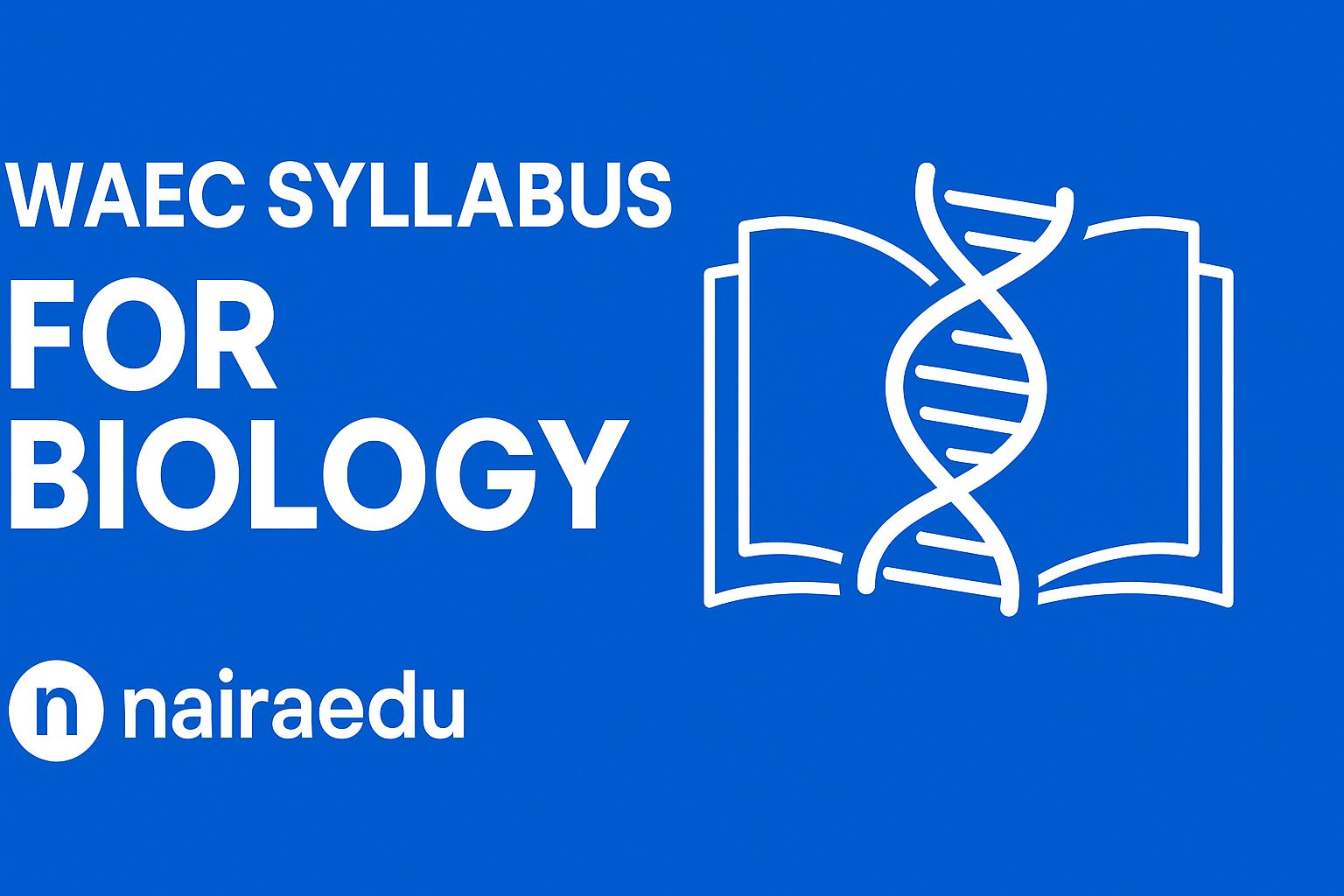The WAEC Syllabus for Biology 2026 is the definitive guide for all students preparing for the upcoming West African Senior School Certificate Examination (WASSCE) for school and private candidates. At Nairaedu.com, we understand that having a clear roadmap is the first step toward academic success.
This compiled guide provides an in depth, topic by topic breakdown of the entire syllabus, ensuring you know exactly what to study, how the exam is structured, and how to prepare effectively.
Using this guide, you can confidently navigate the vast subject of Biology. It will help you focus your efforts on the most important topics and prepare for all three papers of the WAEC Biology exam. Let’s get started on your journey to an A1!
Understanding the WAEC Biology Exam Structure
Success in any examination, especially one as important as WAEC, hinges on a deep understanding of its structure. The WAEC Biology examination is a composite paper, meaning it is divided into three sections (papers) that are often taken at one sitting. Here is a detailed breakdown of each paper.
1. Paper 1: Objective Questions
- Format: This paper consists of 50 multiple choice objective questions.
- Duration: You will be given 50 minutes to complete this section.
- Marks: Each question carries 1 mark, for a total of 50 marks.
- Content: All questions are drawn exclusively from Section A of the syllabus, which covers fundamental biology topics common to all WAEC candidates. A strong grasp of these core concepts is essential for a high score in this paper.
2. Paper 2: Essay and Structured Questions
- Format: This paper comprises a combination of structured and essay questions. It is designed to test your ability to apply biological principles, analyze data, and express your understanding clearly.
- Duration: This paper lasts for 1 hour and 40 minutes.
- Marks: It is worth a total of 70 marks.
Content Breakdown:
- You must answer two questions from Section A (general topics).
- You must answer all questions from either Section B (for candidates in Ghana) or Section C (for candidates in Nigeria, Sierra Leone, The Gambia, and Liberia).
3. Paper 3: Practical
This is arguably the most important and often feared part of the examination. It assesses your practical skills and ability to apply theoretical knowledge in a laboratory setting. A mastery of this paper demonstrates true understanding of the subject.
- Format: This paper focuses on experiments and laboratory-based questions. You will be provided with biological specimens or diagrams to identify, draw, and analyze.
- Duration: The practical exam lasts for 2 hours.
- Marks: It is worth a total of 80 marks.
Content Breakdown:
- Section A: Two compulsory questions for all candidates.
- Section B: One question for Ghanaian candidates.
- Section C: One question for candidates in Nigeria, Sierra Leone, The Gambia, and Liberia.
Understanding this structure allows you to build a targeted and effective study plan. It is not enough to simply read your notes; you must practice answering objective questions, writing detailed essays, and performing the required practical skills.
Detailed Breakdown of the WAEC Biology Syllabus 2026
The WAEC Biology syllabus is extensive, covering a wide range of topics from the microscopic world of cells to the complexities of ecosystems and genetics. Here is a detailed breakdown of each section, with key concepts to focus on.
Section A: General Topics for All Candidates
This section forms the foundation of the entire Biology curriculum and is mandatory for all WAEC candidates.
Concept of Living Things:
- Characteristics of living organisms (MRS NIGER D) and non-living things.
- Classification of organisms into kingdoms, including the differences between plants and animals.
Organization of Life:
- Hierarchical levels of biological organization: from a simple cell to complex organ systems.
- Understanding different forms of living cells (single, colony, filament, and parts of an organism).
Cell Biology:
- Detailed structure and functions of cell organelles (nucleus, mitochondria, chloroplasts, etc.).
- Core differences between plant and animal cells.
Processes of Life:
- Physical and Biophysical Processes: A deep dive into diffusion, osmosis, and active transport. Understand the role of concentration gradients and energy.
- Nutrition: Explore autotrophic (photosynthesis) and heterotrophic nutrition (holozoic, parasitic, saprophytic, and symbiotic).
- Respiration: Grasp the differences between aerobic and anaerobic respiration and the mechanisms of energy release.
- Growth and Development: Mechanisms of growth through cell division and enlargement.
- Reproduction: Compare and contrast asexual (budding, binary fission) and sexual reproduction.
- Movement and Locomotion: Structures for movement in different organisms, from amoeba to vertebrates.
Transport Systems:
- Circulation in Animals: Structure and function of the mammalian heart, blood components (red blood cells, white blood cells, platelets, plasma), and blood vessels.
- Transport in Plants: Understand water uptake via roots, the process of transpiration, and the translocation of food.
Excretory and Respiratory Systems:
- Gaseous Exchange: Study how gases are exchanged in different organisms (e.g., lungs in mammals, gills in fish, stomata in plants).
- Excretion: The process of removing metabolic waste products in both plants and animals.
Ecology and Environmental Management:
- Ecosystems: Components (biotic and abiotic), food chains, food webs, and the flow of energy.
- Pollution: Types of pollution (air, water, land, noise), their causes, and their effects.
- Conservation: The importance of protecting natural resources and maintaining ecological balance.
Section B: Topics for Ghanaian Candidates
This section is designed to build on the foundational knowledge from Section A and is specific to candidates in Ghana.
Advanced Biological Concepts:
- Body symmetry (radial and bilateral) and how it relates to an organism’s lifestyle.
- The art of biological drawings and diagrams: emphasis on clear labeling and accuracy.
Genetics and Heredity:
- DNA: The structure of DNA (the double helix) and its crucial role in genetics.
- Mendel’s Laws: A thorough understanding of Gregor Mendel’s experiments and the laws of segregation and independent assortment. Be prepared to solve genetic problems.
Practical Topics:
- Detailed study of single-celled organisms like Amoeba, Paramecium, and Euglena.
- Observation and description of the external features of mosses and ferns, and their ecological roles.
Section C: Topics for Nigeria, Sierra Leone, The Gambia, and Liberia
This section focuses on more complex topics relevant to students in these specific West African countries. It links biological concepts to human health, evolution, and more advanced ecological cycles.
Advanced Ecology:
- In-depth study of the Nitrogen and Carbon cycles.
- Differences between aquatic and terrestrial habitats and the adaptations of organisms to these environments.
Health and Diseases:
- Importance of public health measures, including immunization.
- Understanding the role of microorganisms (both beneficial and harmful).
- Knowledge of diseases like malaria, cholera, and typhoid.
Plant and Animal Nutrition:
- A detailed look at photosynthesis, including the light and dark reactions.
- Components of a balanced diet and practical food tests (for starch, protein, etc.).
- The process of digestion in humans and other selected animals.
Reproduction:
- The differences between sexual and asexual reproduction.
- Structure and function of the male and female reproductive systems in humans.
- Study of reproduction in flowering plants (pollination, fertilization, fruit development).
Evolution and Genetics:Evidence for Evolution:
- Fossils and homologous structures.
- Theories of Evolution: Understand Darwin’s theory of natural selection.
- Genetics: Concepts like linkage, sex determination, and sex linked traits.
Key Areas of Concentration for Success
While the entire syllabus is important, certain topics are more frequently tested in both theory and practical exams. We recommend giving extra attention to these key areas:
- Classification and Organization of Life: Questions on kingdoms, cell organization, and basic differences between organisms are very common.
- Cell and its Environment: Master the processes of diffusion, osmosis, and active transport. These are a staple of the objective and theory papers.
- Transport, Respiratory, and Excretory Systems: Understand the mechanisms of blood circulation in humans, transport in plants, gaseous exchange, and waste removal.
- Reproduction: Be an expert on both sexual and asexual reproduction in plants and animals.
- Ecology: The study of food chains, food webs, and environmental issues like pollution is a recurring theme.
- Practical Skills: Pay close attention to the practical syllabus. Be able to identify specimens, draw diagrams with correct labeling, and understand the principles behind common biology experiments.
Proven Study Strategies for WAEC Biology
Simply reading the syllabus is not enough. You need an effective strategy to convert knowledge into results.
- Start Early and Create a Study Plan: Divide the syllabus into manageable chunks and allocate time for each topic.
- Use Past Questions: Solve as many WAEC past questions as possible. This helps you understand the exam format, common question types, and time management.
- Master Practical Skills: Do not neglect the practical aspect. Practice drawing specimens, labeling diagrams, and understanding the theory behind experiments.
- Use the Syllabus as a Checklist: Go through the syllabus and tick off each topic as you master it. This helps you track your progress and ensures you don’t miss anything.
- Form a Study Group: Discussing difficult topics with peers can clarify concepts and expose you to new perspectives.
Download the Official WAEC Biology Syllabus PDF
For your convenience, you can download the most recent official WAEC Biology syllabus available. As of now, the 2025 syllabus remains the active guide for students. Simply click on the link below to get your copy and start preparing with confidence.
WAEC-Biology SyllabusDOWNLOAD
We will update this link as soon as the official 2026 syllabus is released.
RELATED POST
Breaking: WAEC Announces Registration Dates & New Format for WASSCE 2026
WAEC GCE 2nd Series 2025 Registration: Guidelines, Fees & Deadlines
JAMB Subject Combination for All Courses 2026 (UTME & O’Level)
FAQs on WAEC Biology 2026
Q1: When will the WAEC Biology 2026 examination be held?
The official timetable for WAEC 2026 has not yet been released. You should regularly check the official WAEC website for updates.
Q2: Is the WAEC Biology syllabus for private candidates different from school candidates?
No, the syllabus is the same for both school and private candidates (GCE). The exam structure and content are identical.
Q3: What are the best textbooks for WAEC Biology?
The WAEC-recommended textbooks are an excellent resource. These include books by authors like S.T. Ramalingam, M.B. Ogunniyi, and others. Your school will also have a list of recommended texts.
Feel free to drop a comment below if you have any further questions about the WAEC Biology 2026 syllabus or exam. Your success is our priority at Nairaedu.com!
This video provides a playlist of tutorials and lectures on topics within the JAMB and WAEC 2026 Biology syllabus.

Mr. Femi is an education blogger who simplifies exam updates and study tips for Nigerian students. His goal is to make learning smart, easy, and rewarding.


1 thought on “WAEC Syllabus for Biology 2026, Study Guide & Key Topics”